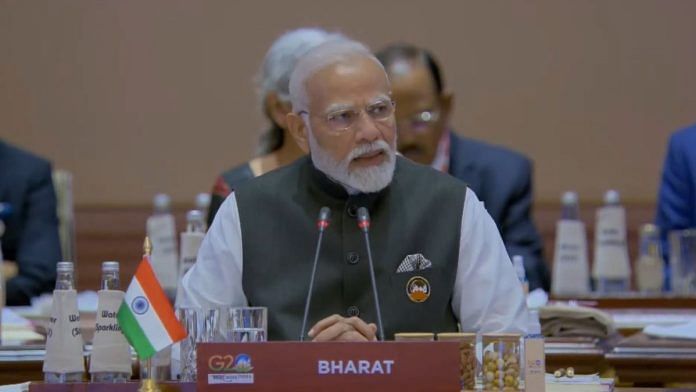Chinese President Xi Jinping may have skipped the ongoing G20 summit in Delhi, but citizens and media are taking a deep interest in what’s going on in India — from paying close attention to the details of the meeting to blaming the West for ‘shaping’ the agenda to fuelling nationalist sentiment at home.
Prime Minister Narendra Modi’s table nameplate reading ‘Bharat’ at the G20 summit and the promotion of the name in the last few days has received attention in Chinese State media.
The number one trend on the search engine Baidu was ‘The name of the country on the table sign in front of Modi is Bharat’. Baidu set up a special page for the G20 news coverage too.
A similar hashtag, ‘Modi’s table sign states that the country’s name is ‘Bharat’’ also started trending on the Chinese social media platform Weibo. While this hashtag was viewed over 2.5 million times, another, ‘2023IndiaG20Summit’ was viewed over 21 million times on Weibo.
On the question of ‘Bharat’, Chinese State media said that previous governments had also tried to change the name and get rid of the ‘colonial thinking’. “Various Indian governments have tried for decades to erase vestiges of the British colonial era by renaming roads and even entire cities, a process that has been stepped up by Modi’s government, which has emphasised in public speeches that India needs to shed traces of ‘colonial thinking’,” said The Beijing News.
Also read: ‘Big plan, small mindset’. That’s how a top Chinese think-tank is seeing Modi’s G20
A ‘spoiler’ at G20?
Chinese State media and social media paid close attention to India’s leadership at the G20. The nationalist publication Global Times asked who the ‘spoiler’ of the G20 summit was while blaming the United States and West for attempting to add their ‘personal topics’ to the meeting agenda.
“The United States and the West, which often claim to ‘stand together’ with India, are riveted before the summit to speculate on ‘differences’, wanting to stuff their own ‘personal topics’ to this important global economic cooperation platform,” said an authoritative editorial in Global Times.
Nationalism at home
Besides the interest in the G20 agenda set by New Delhi, an old video of a brawl in Eastern Ladakh was leaked on Weibo to overlap with the summit.
Showing an old clash between Indian and Chinese soldiers at Pangong Lake, the video received extensive attention on the platform. It was simultaneously shared by multiple accounts with a history of sharing military-related developments in China.
The clash in the video was a September 2020 brawl in the Finger 4 area of Pangong Lake — one of the first instances of a scuffle that marked the beginning of the ongoing Ladakh stand-off.
Some Chinese social media users said it was hard to distinguish between the People’s Liberation Army (PLA) and the Indian Army soldiers seen in the brawl. “The bravest people are protecting our motherland,” said a user while commenting on the video.
Also read: Xi just handed the mic to Modi at the G20. But without Russia, China,…
African Union, Xi’s tour, joint statement
One of the notable developments coming from the G20 summit is India’s welcome of the African Union as a permanent member. It received attention from Chinese experts.
“In fact, it was initiated by China, but it came to fruition on India’s home court. This was used vividly by the Modi government,” said the South Asia Studies Group on their Weibo page.
Another commentator said that India’s strategy behind welcoming the African Union is part of New Delhi’s attempt to build an image as the ‘spokesperson for developing countries’.
“Taking advantage of the opportunity to assume the G20 rotating presidency for the first time and lead the formulation of themes and agendas, New Delhi ushered in a highlight moment of global governance, and Modi also got a golden opportunity to shape his image as a political strongman at home and abroad,” said a commentary on G20 published by Shenzhen TV.
While the G20 summit was underway in New Delhi, Chinese President Xi Jinping was on an inspection tour of Harbin, Heilongjiang Province in the northeastern region of China, where he called for economic revitalisation of the area.
After tough negotiations with Russia, China, and the United States, New Delhi secured a leader’s declaration at the G20 summit. However, the wording of the joint statement about the use of nuclear weapons being ‘inadmissible’ is palatable for Beijing, as it had agreed to a similar statement at the Bali meeting in 2022. The declaration is a testament to the negotiator’s ability to get China and the US onboard despite surmountable disagreements on the Ukraine war.
Agreeing to the joint statement doesn’t necessarily mean that Beijing will easily accept Delhi’s elevated position in international affairs. The commentaries about the G20 summit published so far prove that Beijing will continue to challenge Delhi’s influence.
The author is a columnist and a freelance journalist. He was previously a China media journalist at the BBC World Service. He tweets @aadilbrar.Views are personal.
(Edited by Humra Laeeq)



